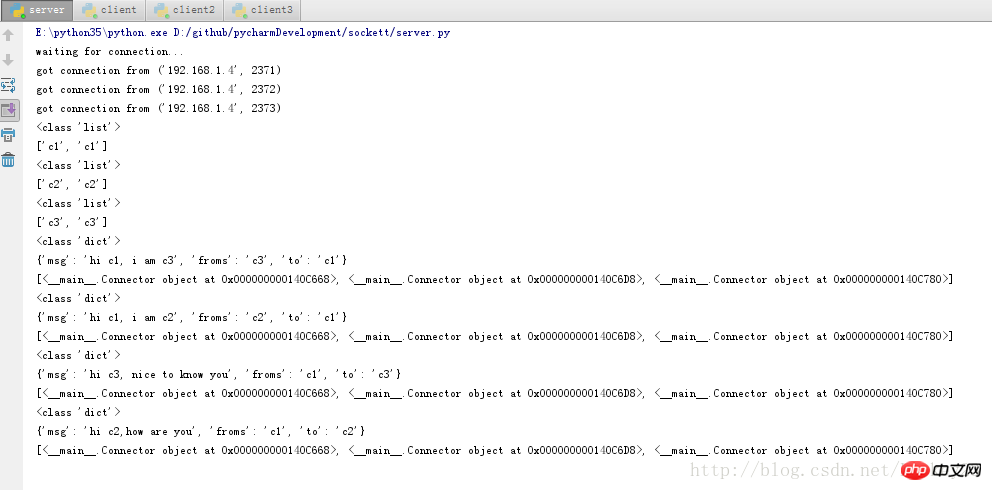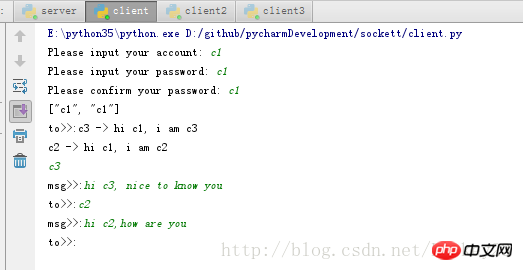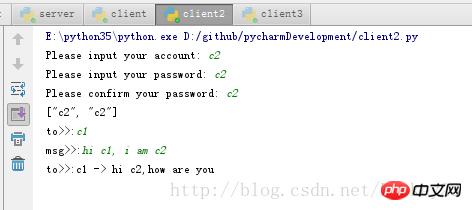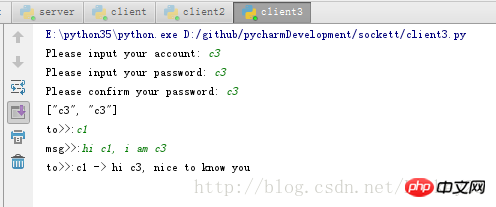Python point-to-point simple implementation
This article mainly introduces python to implement simple point-to-point p2p chat in detail, which has certain reference value. Interested friends can refer to it
Peer-to-point chat is first based on multi-threaded network programming , and the second step is to save each connection as an object with unique attributes and add it to the connection list. The information sent by each connection object must contain three main contents (from, to, messages), so When the information is sent to the server, the server traverses the connection list according to the connection object of to to find the target object and sends the information to the target. After the target gets the information, it will know who sent it and then reply according to the ID number. This implementation will continue to be improved, and subsequent new features will be displayed on my personal github homepage
Server-side implementation:
##
#coding:utf-8
'''
file:server.py
date:2017/9/10 12:43
author:lockey
email:lockey@123.com
platform:win7.x86_64 pycharm python3
desc:p2p communication serverside
'''
import socketserver,json
import subprocess
connLst = []
## 连接列表,用来保存一个连接的信息(代号 地址和端口 连接对象)
class Connector(object):#连接对象类
def __init__(self,account,password,addrPort,conObj):
self.account = account
self.password = password
self.addrPort = addrPort
self.conObj = conObj
class MyServer(socketserver.BaseRequestHandler):
def handle(self):
print("got connection from",self.client_address)
register = False
while True:
conn = self.request
data = conn.recv(1024)
if not data:
continue
dataobj = json.loads(data.decode('utf-8'))
#如果连接客户端发送过来的信息格式是一个列表且注册标识为False时进行用户注册
if type(dataobj) == list and not register:
account = dataobj[0]
password = dataobj[1]
conObj = Connector(account,password,self.client_address,self.request)
connLst.append(conObj)
register = True
continue
print(connLst)
#如果目标客户端在发送数据给目标客服端
if len(connLst) > 1 and type(dataobj) == dict:
sendok = False
for obj in connLst:
if dataobj['to'] == obj.account:
obj.conObj.sendall(data)
sendok = True
if sendok == False:
print('no target valid!')
else:
conn.sendall('nobody recevied!'.encode('utf-8'))
continue
if __name__ == '__main__':
server = socketserver.ThreadingTCPServer(('192.168.1.4',8022),MyServer)
print('waiting for connection...')
server.serve_forever()#coding:utf-8
'''
file:client.py.py
date:2017/9/10 11:01
author:lockey
email:lockey@123.com
platform:win7.x86_64 pycharm python3
desc:p2p communication clientside
'''
from socket import *
import threading,sys,json,re
HOST = '192.168.1.4' ##
PORT=8022
BUFSIZ = 1024 ##缓冲区大小 1K
ADDR = (HOST,PORT)
tcpCliSock = socket(AF_INET,SOCK_STREAM)
tcpCliSock.connect(ADDR)
userAccount = None
def register():
myre = r"^[_a-zA-Z]\w{0,}"
#正则验证用户名是否合乎规范
accout = input('Please input your account: ')
if not re.findall(myre, accout):
print('Account illegal!')
return None
password1 = input('Please input your password: ')
password2 = input('Please confirm your password: ')
if not (password1 and password1 == password2):
print('Password not illegal!')
return None
global userAccount
userAccount = accout
return (accout,password1)
class inputdata(threading.Thread):
def run(self):
while True:
sendto = input('to>>:')
msg = input('msg>>:')
dataObj = {'to':sendto,'msg':msg,'froms':userAccount}
datastr = json.dumps(dataObj)
tcpCliSock.send(datastr.encode('utf-8'))
class getdata(threading.Thread):
def run(self):
while True:
data = tcpCliSock.recv(BUFSIZ)
dataObj = json.loads(data.decode('utf-8'))
print('{} -> {}'.format(dataObj['froms'],dataObj['msg']))
def main():
while True:
regInfo = register()
if regInfo:
datastr = json.dumps(regInfo)
tcpCliSock.send(datastr.encode('utf-8'))
break
myinputd = inputdata()
mygetdata = getdata()
myinputd.start()
mygetdata.start()
myinputd.join()
mygetdata.join()
if __name__ == '__main__':
main()



The above is the detailed content of Python point-to-point simple implementation. For more information, please follow other related articles on the PHP Chinese website!

Hot AI Tools

Undresser.AI Undress
AI-powered app for creating realistic nude photos

AI Clothes Remover
Online AI tool for removing clothes from photos.

Undress AI Tool
Undress images for free

Clothoff.io
AI clothes remover

AI Hentai Generator
Generate AI Hentai for free.

Hot Article

Hot Tools

Notepad++7.3.1
Easy-to-use and free code editor

SublimeText3 Chinese version
Chinese version, very easy to use

Zend Studio 13.0.1
Powerful PHP integrated development environment

Dreamweaver CS6
Visual web development tools

SublimeText3 Mac version
God-level code editing software (SublimeText3)

Hot Topics
 Is the conversion speed fast when converting XML to PDF on mobile phone?
Apr 02, 2025 pm 10:09 PM
Is the conversion speed fast when converting XML to PDF on mobile phone?
Apr 02, 2025 pm 10:09 PM
The speed of mobile XML to PDF depends on the following factors: the complexity of XML structure. Mobile hardware configuration conversion method (library, algorithm) code quality optimization methods (select efficient libraries, optimize algorithms, cache data, and utilize multi-threading). Overall, there is no absolute answer and it needs to be optimized according to the specific situation.
 How to convert XML files to PDF on your phone?
Apr 02, 2025 pm 10:12 PM
How to convert XML files to PDF on your phone?
Apr 02, 2025 pm 10:12 PM
It is impossible to complete XML to PDF conversion directly on your phone with a single application. It is necessary to use cloud services, which can be achieved through two steps: 1. Convert XML to PDF in the cloud, 2. Access or download the converted PDF file on the mobile phone.
 What is the function of C language sum?
Apr 03, 2025 pm 02:21 PM
What is the function of C language sum?
Apr 03, 2025 pm 02:21 PM
There is no built-in sum function in C language, so it needs to be written by yourself. Sum can be achieved by traversing the array and accumulating elements: Loop version: Sum is calculated using for loop and array length. Pointer version: Use pointers to point to array elements, and efficient summing is achieved through self-increment pointers. Dynamically allocate array version: Dynamically allocate arrays and manage memory yourself, ensuring that allocated memory is freed to prevent memory leaks.
 Is there any mobile app that can convert XML into PDF?
Apr 02, 2025 pm 08:54 PM
Is there any mobile app that can convert XML into PDF?
Apr 02, 2025 pm 08:54 PM
An application that converts XML directly to PDF cannot be found because they are two fundamentally different formats. XML is used to store data, while PDF is used to display documents. To complete the transformation, you can use programming languages and libraries such as Python and ReportLab to parse XML data and generate PDF documents.
 How to convert xml into pictures
Apr 03, 2025 am 07:39 AM
How to convert xml into pictures
Apr 03, 2025 am 07:39 AM
XML can be converted to images by using an XSLT converter or image library. XSLT Converter: Use an XSLT processor and stylesheet to convert XML to images. Image Library: Use libraries such as PIL or ImageMagick to create images from XML data, such as drawing shapes and text.
 Recommended XML formatting tool
Apr 02, 2025 pm 09:03 PM
Recommended XML formatting tool
Apr 02, 2025 pm 09:03 PM
XML formatting tools can type code according to rules to improve readability and understanding. When selecting a tool, pay attention to customization capabilities, handling of special circumstances, performance and ease of use. Commonly used tool types include online tools, IDE plug-ins, and command-line tools.
 Is there a mobile app that can convert XML into PDF?
Apr 02, 2025 pm 09:45 PM
Is there a mobile app that can convert XML into PDF?
Apr 02, 2025 pm 09:45 PM
There is no APP that can convert all XML files into PDFs because the XML structure is flexible and diverse. The core of XML to PDF is to convert the data structure into a page layout, which requires parsing XML and generating PDF. Common methods include parsing XML using Python libraries such as ElementTree and generating PDFs using ReportLab library. For complex XML, it may be necessary to use XSLT transformation structures. When optimizing performance, consider using multithreaded or multiprocesses and select the appropriate library.
 What is the process of converting XML into images?
Apr 02, 2025 pm 08:24 PM
What is the process of converting XML into images?
Apr 02, 2025 pm 08:24 PM
To convert XML images, you need to determine the XML data structure first, then select a suitable graphical library (such as Python's matplotlib) and method, select a visualization strategy based on the data structure, consider the data volume and image format, perform batch processing or use efficient libraries, and finally save it as PNG, JPEG, or SVG according to the needs.






